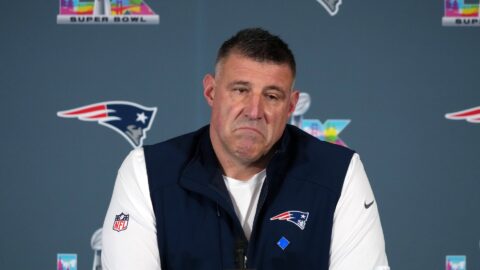The List.
It's been wreaking havoc on Major League Baseball for too long now. It seems to have a mind of its own. And if you ask the Red Sox, it needs to be stopped.
The List has terrible timing. David Ortiz and the Red Sox were about to take the
field against Oakland on Thursday when the designated hitter was
informed that a New York Times article reported that he had tested positive
for performance-enhancing drugs in 2003.
The Sox were trying to rebound from two debilitating losses to a bad AL West team. They were trying
to get on solid ground in time for the most important two months of the
season. Now, instead, they have this to think about.
"Inconvenient" doesn't begin to describe it.
"We still have to go out and focus and play
a game," catcher Jason Varitek said after Boston snagged an 8-5 win, courtesy of a go-ahead, three-run jack by Ortiz himself.
"Regardless of what goes on, you can't change history and change what
has happened and what hasn't happened. We don't know. We have to go
out there and focus on playing games."
Others, like second baseman Dustin Pedroia, plan to ignore the media
speculation surrounding Big Papi. When asked whether he'll read Michael
S. Schmidt's article, he quipped, "I don't read very
good. I don't read articles or anything like that, so no."
Some say they would rather focus on the overwhelming positive than the
underwhelming negative. Count third baseman Mike Lowell in that
category; he'd rather talk about division than PEDs.
"One-hundred and three … [divided] by 1,200 … is a little less than 10 percent," he mused as he calculated the percentage of victims claimed by the List thus far. "I would love nice stories about
the
91 percent who didn't test positive and are actually good things for
the game. I know negativity is great media, but I think it's so
unfortunate that we can't harp on what a good win today was."
Some say they don't care because 2003 is ancient history.
Again, enter Pedroia.
"In 2003, I was in college, hitting rockets there," he said. "I don't know s— about what was going on then."
In 2003, Major League Baseball tested players for performance enhancing substances in order to gauge whether or not the league needed to implement a drug testing policy. If more than five percent of players tested positive for steroids, the league would agree to start testing players regularly.
Players were all tested anonymously (or so they thought). They supposedly became nameless and were assigned numbers. They were tested, and they were told their names would never be released.
Except the List lied, and now, the List is infecting the Red Sox clubhouse, starting with Ortiz — and nobody really knows how to stop it.
"I thought the whole time we weren't even supposed to have a list," said first baseman Kevin Youkilis. "There wasn't supposed to be a list out. I don't even know how names are
attached to numbers. I don't understand how it all happened."
There was Barry Bonds, Alex Rodriguez, Manny Ramirez and now Ortiz. The names are trickling out every couple of months, and nobody knows who the information is coming from.
"The way it's going right now, we'll be dealing with this for the next 10 years," Youkilis said. "We're in for a long haul. I think it's amazing how names are popping up here and there. It seems like we're starting from the top with superstars and maybe we'll weed down to the guys who maybe had a year in."
Maybe more names will be revealed. Maybe they won't. Maybe — just maybe — the List should be treated like the bully it is. Everyone knows that if you stop giving bullies attention, they go away.
Varitek is on board. Are you?
"Right now? Today?" he inquired, when asked if the List is at all relevant.
"No."



